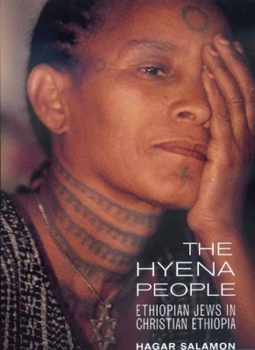The Hyena People: Ethiopian Jews in Christian Ethiopia Volume 13
(Part of the Contraversions: Critical Studies in Jewish Literature, Culture, and Society Series)
Select Format
Select Condition 
Book Overview
The Jews (Falasha) of northwestern Ethiopia are a unique example of a Jewish group living within an ancient, non-Western, predominantly Christian society. Hagar Salamon presents the first in-depth study of this group, called the "Hyena people" by their non-Jewish neighbors. Based on more than 100 interviews with Ethiopian immigrants now living in Israel, Salamon's book explores the Ethiopia within as seen through the lens of individual memories and expressed through ongoing dialogues. It is an ethnography of the fantasies and fears that divide groups and, in particular, Jews and non-Jews.
Recurring patterns can be seen in Salamon's interviews, which thematically touch on religious disputations, purity and impurity, the concept of blood, slavery and conversion, supernatural powers, and the metaphors of clay vessels, water, and fire.
The Hyena People helps unravel the complex nature of religious coexistence in Ethiopia and also provides important new tools for analyzing and evaluating inter-religious, interethnic, and especially Jewish-Christian relations in a variety of cultural and historical contexts.
Recurring patterns can be seen in Salamon's interviews, which thematically touch on religious disputations, purity and impurity, the concept of blood, slavery and conversion, supernatural powers, and the metaphors of clay vessels, water, and fire.
The Hyena People helps unravel the complex nature of religious coexistence in Ethiopia and also provides important new tools for analyzing and evaluating inter-religious, interethnic, and especially Jewish-Christian relations in a variety of cultural and historical contexts.
Format:Paperback
Language:English
ISBN:0520219015
ISBN13:9780520219014
Release Date:December 1999
Publisher:University of California Press
Length:168 Pages
Weight:0.05 lbs.
Dimensions:0.6" x 6.0" x 9.0"
Customer Reviews
2 ratings
Well-done, but incomplete
Published by Thriftbooks.com User , 16 years ago
Excellent academic account of Ethiopian Jewish-Christian rivalry in native Ethiopia. The author has conducted "exit"-style interviews, anthro style, with Ethiopian Jewish emigrees to Israel, once settled in the Holy Land, about their experiences with Christian neighbors back in Ethiopia. The info gleaned is priceless, unsettling, and invited as many questions as answers. The profundity of the Ethiopian Jewish experience is something Global Jewry is only beginning to grasp (caught up earlier, unfortunately, in a "are you *really* Jewish game", perhaps a (unnecessary) defensive formation towards a potentially more legitimate (strictly Old Testament) African Jewish experience?). This book makes a credible and substantive contribution towards this new realization. My only critique of the book is in the author's somewhat cliched "academic" response to the Beta Israel's spiritual beliefs. Like most Western textual analysis, the author downplays any claims to legitimacy in the Beta Israel's "animistic" or "superstitious" beliefs, choosing instead to explain them away with rational pseudo-psychological explanations. Sometimes these explanations are plausible; sometimes they seem more like a desperate attempt to "colonize" or "own" the Beta Israel's experience by virtue of being able to dissect and explain it. At these junctures in the book, I think it would have been more appropriate of the author to simply let the stories speak for themselves, and let the reader draw their own conclusions. That said, it is still an excellent book and I'm glad the author did the no doubt difficult work of compiling these stories. Hopefully, we will see more work like this before the generation that was part of this Exodus passes. Ethiopian-inspired Cooking, Vegetarian Specialties
good, but academic
Published by Thriftbooks.com User , 17 years ago
This book was fascinating. Unfortuanetly, it is written in a highly academic style, making it a bit dry. I found the first couple of chapters slow, buit then it got more interesting, with great quotes, really getting into the subject of what it was like ot be a Jew in Ethiopia.






